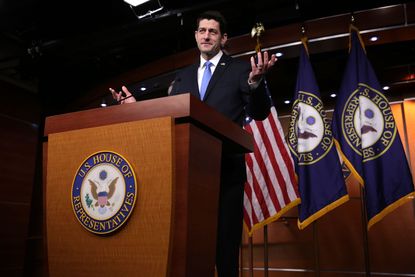Paul Ryan has a plan to fix the GOP. It's pretty good, too.
Can the speaker of the House unite the conservative movement and really get things done?


Ever since he became speaker of the House, Paul Ryan has generated a lot of excitement among conservatives — and also very high expectations. He's bound to make some people unhappy eventually.
Recently, Ryan gave an important speech at Heritage Action, one of the political groups that made life particularly difficult for his predecessor, John Boehner.
The coverage of the speech focused on a sound bite: his call to, in the words of William Wallace in Braveheart, "unite the clans."
Subscribe to The Week
Escape your echo chamber. Get the facts behind the news, plus analysis from multiple perspectives.

Sign up for The Week's Free Newsletters
From our morning news briefing to a weekly Good News Newsletter, get the best of The Week delivered directly to your inbox.
From our morning news briefing to a weekly Good News Newsletter, get the best of The Week delivered directly to your inbox.

The Republican Party is in ideological disarray, and in a state of low-level war. The grassroots are angry, very angry at the establishment. In general this has been a healthy dynamic: It has given us some of the greatest political stars of the country, like Sen. Mike Lee and, well, Speaker Ryan.
But it has also led the conservative movement to behave like a circular firing squad and to embark on politically disastrous follies like the government shutdown over ObamaCare. It's also probably limited the ability of Congress to pass legislation.
This is a dynamic that the Democrats, and in particular President Obama, have tried to exploit. Obama has been very good at trolling the GOP by emphasizing wedge issues like the so-called "war on women," or immigration enforcement, or the Second Amendment — and the GOP has been eager to take the bait. That's always dumb politics, but particularly in an election year.
But Ryan's call wasn't simply to "unite the clans," simply for the sake of making it easier for the GOP to regain the White House this year, although that's an important goal. Ryan is a policy wonk, one who is determined to achieve a policy agenda. One line that he has been trotting out has been the need to become "a proposition party" instead of "an opposition party."
As Ramesh Ponnuru has pointed out, one reason why so many in the Tea Party have spent so much time running around like headless chickens, or walking into easily defused political traps, is because they have failed to rally around an agenda. Part of the reason why Boehner found it impossible to placate them is that they didn't have an "ask" — a set of concrete policies they would like to see enacted.
He is essentially calling out, in friendly tones, the conservative rebels: You want a seat at a table? With me, you have a seat at the table. But come to the table with specific positions and specific requests you'd like to see enacted.
The long-term goal is to set a legislative agenda that, by giving enough of something to everyone (and, perhaps, skirting some too-touchy issues like immigration), will keep the peace for long enough, and unite the various factions of the Republican Party behind something constructive.
There's another reason why Ryan is doing this. Ryan cares about Congress and he cares about the Constitution, and he wants Congress to take a leadership role in policy formation again. From Ryan's perspective as speaker, the best thing for his party and branch of government to do is to set up an agenda now, so that whoever ends up being the Republican presidential nominee can point to something constructive associated with the Republican Party, and, hopefully, help enact it when president.
And what is that agenda? Here's Ryan: "We have to take our founding principles — freedom, liberty, free enterprise, self-determination, government by consent — apply them to the problems of the day, and come up with real solutions."
This may sound like blather, but it also sounds a little like the sort of thing for which right-wing intellectuals known as reform conservatives have been calling for years: a movement to reform the GOP's policy goals to find a conservative answer to the challenges of the 21st century.
Such an agenda might include tax reform that doesn't just focus on investment and top-rate cuts, but would put money in the pockets of working families in the form of an expanded child tax credit. The project might also involve reforming and expanding the most successful anti-poverty initiative of the past 40 years, the Earned Income Tax Credit, into a set of wage subsidies that would boost working class employment. Other positive, conservative reforms might involve health care changes that wouldn't just get rid of many onerous regulations, but also cover as many people as ObamaCare does. It's hard to imagine Ryan's policy reforms wouldn't include proposals on entitlement reform, and changes influenced by his pioneering work trying to fight poverty.
But regardless of specifics, Ryan has the right idea: If conservatives want to win, then they have to think about how their principles can be applied to the challenges of the 21st century, and can directly help ordinary American people.
Those are all great ideas, and it would be great, for constitutional reasons, to see Congress driving them, rather than the president. So conservatives should line up behind Paul Ryan, not just because it's smart politics that will help them win the White House, but because it's the way to make the country better.
Create an account with the same email registered to your subscription to unlock access.
Sign up for Today's Best Articles in your inbox
A free daily email with the biggest news stories of the day – and the best features from TheWeek.com
Pascal-Emmanuel Gobry is a writer and fellow at the Ethics and Public Policy Center. His writing has appeared at Forbes, The Atlantic, First Things, Commentary Magazine, The Daily Beast, The Federalist, Quartz, and other places. He lives in Paris with his beloved wife and daughter.
-
 'Biden is smart to keep the border-security pressure on'
'Biden is smart to keep the border-security pressure on'Instant Opinion Opinion, comment and editorials of the day
By Harold Maass, The Week US Published
-
 Bird flu worries mount as virus found in milk, cows
Bird flu worries mount as virus found in milk, cowsSpeed Read The FDA found traces of the virus in pasteurized grocery store milk
By Peter Weber, The Week US Published
-
 Palazzo Durazzo Suites in Genoa: a palatial gem in northern Italy
Palazzo Durazzo Suites in Genoa: a palatial gem in northern ItalyThe Week Recommends Live your Italian dream in this astonishing and recently restored palace in the heart of the city
By Nick Hendry Published
-
 Arizona court reinstates 1864 abortion ban
Arizona court reinstates 1864 abortion banSpeed Read The law makes all abortions illegal in the state except to save the mother's life
By Rafi Schwartz, The Week US Published
-
 Trump, billions richer, is selling Bibles
Trump, billions richer, is selling BiblesSpeed Read The former president is hawking a $60 "God Bless the USA Bible"
By Peter Weber, The Week US Published
-
 The debate about Biden's age and mental fitness
The debate about Biden's age and mental fitnessIn Depth Some critics argue Biden is too old to run again. Does the argument have merit?
By Grayson Quay Published
-
 How would a second Trump presidency affect Britain?
How would a second Trump presidency affect Britain?Today's Big Question Re-election of Republican frontrunner could threaten UK security, warns former head of secret service
By Harriet Marsden, The Week UK Published
-
 'Rwanda plan is less a deterrent and more a bluff'
'Rwanda plan is less a deterrent and more a bluff'Instant Opinion Opinion, comment and editorials of the day
By The Week UK Published
-
 Henry Kissinger dies aged 100: a complicated legacy?
Henry Kissinger dies aged 100: a complicated legacy?Talking Point Top US diplomat and Nobel Peace Prize winner remembered as both foreign policy genius and war criminal
By Harriet Marsden, The Week UK Last updated
-
 Trump’s rhetoric: a shift to 'straight-up Nazi talk'
Trump’s rhetoric: a shift to 'straight-up Nazi talk'Why everyone's talking about Would-be president's sinister language is backed by an incendiary policy agenda, say commentators
By The Week UK Published
-
 More covfefe: is the world ready for a second Donald Trump presidency?
More covfefe: is the world ready for a second Donald Trump presidency?Today's Big Question Republican's re-election would be a 'nightmare' scenario for Europe, Ukraine and the West
By Sorcha Bradley, The Week UK Published